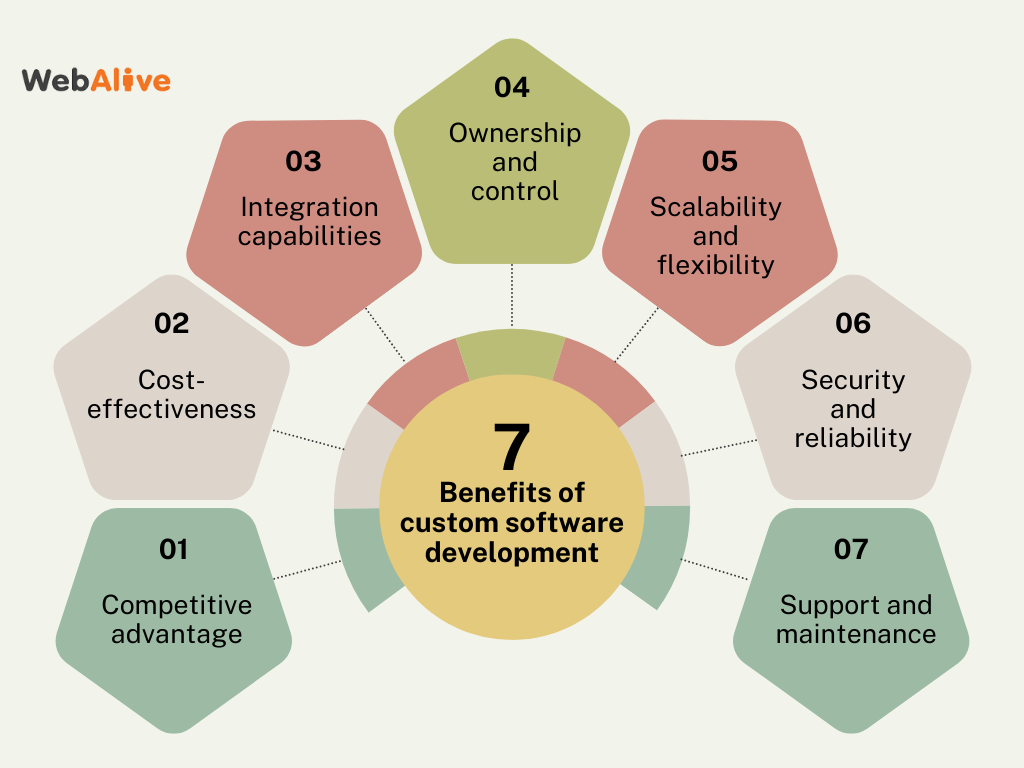
7 Benefits of Custom Software Development for Business
If you are planning to start your business, or extend the reach or elevate operations, with the support of a software solution, chances that you are having a hard time deciding between custom software development and off-the-shelf software.
You might doubt which will be worth your time and money.
If you want to build something that will accommodate your unique operations, processes and challenges, custom software can always be a viable solution instead of adopting a generic one-size-fits-all approach.
Let’s see what the number says. According to a report by Grand View Research, in 2023, the global custom software development market was valued at approximately USD 35.42 billion and is expected to grow at a compound annual growth rate (CAGR) of 22.5% from 2024 to 2030.
But before you make a final decision, knowing the benefits of tailor-made software will help you decide whether to go for tailor-made software or not. So, let’s discover the benefits of custom software development first.
7 key benefits of custom software development
Custom software is a popular choice for many companies. Let’s look into some of the advantages.

1. Competitive advantage
Unlike off-the-shelf software, custom software is tailored to align perfectly with specific business goals and operations. And this personalisation allows your business to differentiate themselves in the market.
Here’s how custom software delivers a competitive edge.
Personalised features: You can implement features and functionalities like advanced analytics, unique customer engagement tools or workflow automation specific to your industry.
Better user experience (UX): Businesses can design intuitive interfaces tailored to their target audience, leading to higher user experience.
Adaptability to market changes: As the business grows or the market evolves, custom software can be scaled or modified to meet new requirements.
We can take Amazon’s custom logistics and inventory management system as an example. It enables real-time inventory tracking, optimised delivery routes, dynamic pricing and what not. All these custom features give Amazon a competitive edge by ensuring quicker delivery times, lower operational costs and higher customer satisfaction.
2. Cost-effectiveness
Despite its higher upfront investment, custom software is viewed as a cost-effective option. They key lies in its ability to minimise ongoing costs, optimise operations and deliver long-term value.
Though the initial investment is higher, custom software does not require any recurring licensing fees, subscription costs, or any additional charges for updates, add-ons, or per-user pricing. Also, it is designed to address specific workflows and processes while eliminating all the unnecessary features.
For example, a logistics company that uses custom software to plan delivery routes more efficiently ends up reducing fuel costs and saving employees time that would otherwise be spent figuring out the best routes. Compared to generic software, this tailored solution saves the company a lot of money.
Custom software also eliminates dependency by granting full control over the software lifecycle. All these make custom software a cost-effective choice specially for businesses that are looking for long term solutions.
3. Integration capabilities
Integration capabilities refer to the ability of custom software to work harmoniously with existing tools, platforms and processes. Custom software can be integrated with any sort of system, such as CRM, ERP and accounting software. This eliminates the need for manual entry as well as reduces the risk of human error.
Custom software can also significantly boost efficiency by automating repetitive tasks and workflows through integration with other tools and services. All these facilitate collaboration between teams and departments. As custom software is built with specific workflows, tools and platforms in mind, it ensures that the new solution integrates with legacy systems, databases and third-party APIs with no disruptions.
For example, an online retailer can develop a custom ecommerce platform that integrates with their inventory management system, payment gateway and shipping provider. So when a customer places an order on the ecommerce platform, the information is automatically synced with the inventory management system.
4. Ownership and control
When you are investing in custom software development, you get complete ownership of each and every aspect of the software. You can add features that align precisely with your business goals. Later, when needed, you can add new functionalities without waiting for a vendor’s update cycle or paying extra. Also, you can scale your software’s operations without limits.
With custom software, you will no longer be bound by a vendor’s pricing, terms or discontinuation of service. So, there will be no risk regarding sudden price hikes, forced upgrades or service termination. Owning the software also means your data will entirely reside under your control. Instead of worrying about vendors’ vulnerabilities, you can implement robust security measures tailored to your industry standards.
A prominent example will be Tesla who have their full control over its vehicles’ performance, updates and features. It does not rely on external vendors.
5. Scalability and flexibility
Scalability and flexibility refer to the ability of custom software to adapt and expand in response to a business’s growth. Developers design custom software with a scalable architecture so that it can handle increased workloads, users or data. Also, it is very common to modify the business strategies as per market trends or technological advancements. And custom software allows that too.
For example, a logistics company might have used custom software to track deliveries at the very beginning. However, as the business diversifies into warehousing, the software adds new functionalities like inventory management features, route optimisation, and real-time vehicle tracking.
Another example is Netflix, which started as a DVD rental service. And day after day, as streaming technology became popular, they transitioned to an online streaming platform. As they had custom software infrastructure, it allowed them to scale from a small user base to handling millions of users worldwide.
6. Security and reliability
One of the most compelling advantages of custom software is its superior security and reliability. Custom software offers maximum security through rigorous risk assessments, robust encryption, regular security audits and more. You can easily identify and mitigate any potential vulnerabilities, restrict access to sensitive data and protect confidential information while keeping the system up-to-date by maintaining all latest security practices.
Also, due to less exposure, custom software is less likely to face cyberattacks. When you have direct control over the updates and patches it eventually enable proactive vulnerability management. So, you can ensure prompt response in case of security threats.
Custom software is also designed to optimise performance and minimise downtime as it aligns with specific workflows and hardware. Through rigorous testing, it ensures reliable and consistent functionality while minimising the risk of errors and system failures.
7. Support and maintenance
Another significant benefit of custom software development is the level of support and maintenance that custom software offers. With custom software, you get direct access to the development team, which enables you to address any issues or concerns quickly. The direct line of communication ensures prompt support. The support or development team proactively identifies your potential issues and keeps your software aligned with your evolving business needs by making modifications as per your needs.
No matter whether you encounter a bug, need to implement a new feature, or require assistance with training and onboarding, you will get tailored support and guidance. Many custom software service providers even come with long-term support contracts that guarantee ongoing maintenance and updates.
What is custom software development?
Custom software development is all about creating a solution that is specially designed to fit the needs of your business. It is not only about writing code and building software, but also include understanding a business’s unique needs. It allows one to build a solution that meets their specific needs and requirements to make a difference in their day-to-day operations.
What are the key differences between custom and off-the-shelf software?
Customisation: Custom software can be tailored to meet specific business needs. On the other hand, off-the-shelf software comes pre-built with generic features.
Development time: Custom software need more time to design, develop and deploy. But it only requires minimum setup time to build off-the-shelf software.
Integration: Custom software can be seamlessly integrated with existing systems and processes, but off-the-shelf software might face compatibility issues.
Scalability: In terms of scalability, custom software is easily scalable, whereas off-the-shelf software has limited scalability.
Support: With custom software, you will get personalised support and with off-the-shelf software, you will get standardised support.
Some drawbacks of custom software development
- Building custom software may require a higher initial investment.
- It requires more time and effort to develop.
- It takes more time and collaboration from key stakeholders and super users.
- As custom software is built from scratch, there is a chance of unforeseen bugs or errors.
- Integrating custom software with existing systems or third-party tools might be complex or time-consuming.
Popular use cases of custom software
- Ecommerce platforms
- Customer relationship management (CRM)
- Healthcare management systems
- Educational platforms
- Project management tools
- Booking and reservation systems
- Custom mobile applications
How much does custom software development cost?
The cost of custom software development eventually depends on several factors, including the complexity, scope and location of the development team. Also, the complexity of features such as APIs, third-party integrations, data analytics, and user permissions can significantly impact the cost.
Now, if we make a general cost estimate, for small projects that come with basic mobile apps and small-scale websites, it might take around $5000- $20,000. And for medium ones that might include CRM or inventory management systems, it can cost $20,000- $50,000. The larger projects might require $50,000+ to complete.
Final words
Custom software development works as a gamechanger specially for businesses who are seeking tailored solutions to achieve their unique goals. Comparing to the long-term benefits such as enhanced efficiency, robust security and complete ownership, the initial investment seems very minimum. No matter you are a start-up or an established enterprise, you can definitely unlock new levels of innovation and productivity through custom software.
You read a lot. We like that
Want to take your online business to the next level? Get the tips and insights that matter.

